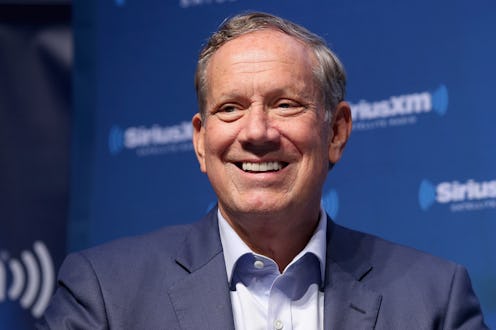News
George Pataki Is A Surpisingly Moderate Republican
Former New York Gov. George Pataki's poll numbers haven't been impressive. Maybe this is because coverage of Pataki in the media has been fairly scant, what with Donald Trump soaking up all of Americans' attentions with every eyebrow-raising thing he says and does and Mike Huckabee and his offensive Holocaust analogies. It's disappointing that he didn't make the cut for Fox's prime-time GOP debate, because frankly, this Republican candidate stands out from his rivals, and unlike many of the other candidates, you probably haven't heard too much about him. So, who is George Pataki?
There's plenty you should know about Pataki — his refreshing (in right-wing terms, at least) stance on abortion rights, his perspective on LGBT rights, the economy, and other hot-button issues — but what you really need to know about him is the interesting collaboration he's been up to lately. This week has been a critical one for the Republican presidential hopeful, as he's been working with Democrats toward an alternative for the Affordable Care Act, aka "Obamacare."
On the surface, this doesn't sound too revolutionary, but think about it: For all the tirades against Obamacare by Ted Cruz, Jeb Bush, and nearly every current GOP candidate, have any of them really shared any concrete ideas for an alternative? Have they really discussed the Affordable Care Act beyond swearing to destroy it? Most importantly, have they really given us any reason to believe they'd compromise with Democrats to work toward a solution?
Pataki's work with Democratic politicians isn't without flaws. "I will work to get Democrats to support our conservative policies. I did that in New York," he stated at Monday night's Voters First Presidential Forum at St. Anselm College. Clearly, Pataki's approach to health care reform isn't purely motivated by receptiveness to Democrats' perspectives; he remains determined to ensure that "conservative policies" prevail. But he's willing to open up a mature discussion with the opposing party to reach an ultimate solution and put on his big kid pants to go beyond slanderous talk, and actively work toward a potentially bipartisan alternative.
This isn't the first time Pataki's approach to politics has been refreshingly moderate. Just look at his stance on abortions. According to On The Issues, Pataki "supports abortion rights," which has certainly hurt his appeal to social conservatives despite claims he can "overcome" the GOP's generally uncompromising pro-life stance. Nonetheless, Pataki has voted against Medicaid abortion funding and has enjoyed support from pro-life groups.
As for same-sex marriage, Pataki signed into law a gay rights bill, according to the The New York Times. On The Issues finds that as of 2007, Pataki is personally against marriage equality, but simultaneously, he believes Republicans should not focus on staunchly opposing both gay marriage and abortion rights. True to his party's values, however, he believes solutions for these hot-button social issues should be made by the states.
Pataki's approach to the environment is fairly similar. The Times reports Pataki has long supported "efforts to curb greenhouse-gas emissions and promote green energy." He remains against mandates from the federal government to combat global warming and has claimed that as president he would limit the EPA's "overreach," but his track-record on supporting green initiatives and emission reduction is impressive lined up next to, say, Scott Walker's. When it comes to immigration, the former New York governor is equally moderate: He wants illegal immigrants to have a pathway to legal status, the Times wrote, as oppose to the mass-deportation approaches of many of his rivals.
Pataki also distinguishes himself from GOP rivals with his support for gun control, an especially critical issue in light of multiple mass shootings this summer that could have been avoided with more secure gun control policies. According to On The Issues, in December 2006, Pataki supported gun control legislation "consistent with mainstream Democratic party principles."
The presidential hopeful remains fairly firm in his fiscal conservatism, though, pushing the usual GOP fight for reduced taxes and government spending. In 2000, Pataki supported "more federal funding for all aspects of Drug War," an issue he hasn't been too vocal about since announcing his candidacy. It's certainly possible that his views have changed, especially as more and more information surfaces about mass incarceration and other frightening effects of the War on Drugs. Maybe his current stance is something he'll have a chance to talk about at the forum on Thursday.
Ultimately, Pataki isn't running with the GOP for no reason — his personal values align pretty well with its stances on the issues. But of all of his rivals, he's the most willing to compromise for real solutions and the most receptive when it comes to America's growing social values. He might just be the candidate for Republicans that support social progress but have their own reasons for standing behind fiscal conservatism. All that, and consider this: Maybe it's a good sign that we've heard almost nothing about him from news outlets.
GOP candidates are all over the news for very little reason other than their disappointing attempts to "out-Trump" each other. I've yet to hear of Pataki unabashedly claiming all Mexican immigrants are basically "rapists" (Trump), likening the Iran deal to the Holocaust (Huckabee), proclaiming teachers' unions deserve "a punch in the face" (Christie), or stating that we're spending too much on women's health (Bush). Media outlets' radio silence on Pataki might just be a positive testament to his character. Simultaneously, it could also be a sign that news sources should start paying more attention to serious candidates, and a little less to, say, Trump.
